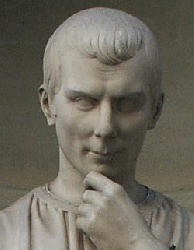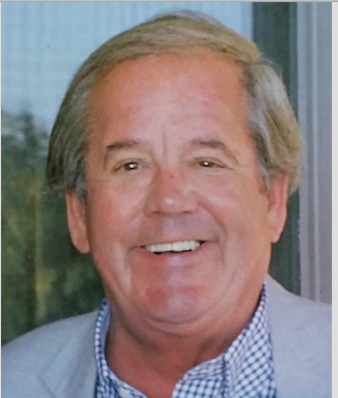
Niccolo Machiavelli
(Image by (From Wikimedia) Frieda derivative: Pietade, Author: Frieda derivative: Pietade Details Source DMCA
TONKA BAY, MINNESOTA
Over 500 hundred years ago modern political thinking started. At its center was the ruthless idea that with a worthwhile end man could justify any means. The spokesman for this idea was Nicolo Machiavelli. In 1498, Machiavelli became the adviser on foreign and military affairs to the government of Florence, one of the great Italian cities of that era. During his fourteen years of service, he wrote a little book called The Prince, which became the handbook of political strategy for governments and their advisers. Just before Machiavelli took office, a public hanging in Florence occurred that had a great impression on him.
The victim was a monk named, Savonarola, who preached that the citizens could be guided by their "natural reason." This idea threatened to challenge the importance of the fathers of the Church, who then showed their dominance by having Savonarola hung in public and set afire, his ashes dumped in the river Arno. In The Prince, Machiavelli refers to Savonarola by saying, "Thus it comes about that all armed prophets have conquered and unarmed ones have failed."
Machiavelli refused to acknowledge and be deflected by utopian dreams or romantic hopes, and by questions of right and wrong, or good and bad. He dedicated The Prince to the rich and powerful Lorenzo di Medici, whose family ruled Florence, the popes and the monarchs. Machiavelli became the father of modern political realism, or what is called realpolitik.
On July 13, 1945, just three days before the explosion of the first atomic bomb in New Mexico, the United States intercepted a secret cable from Japanese Foreign Minister Togo to Ambassador Sato in Moscow. The cable asked Sato to get the Soviets to intercede and indicate that Japan was ready to end the war, as long it was not unconditional surrender.
The one condition necessary for Japan to end the war was an agreement to maintain the sanctity of the Japanese emperor, who was a holy figure in Japanese society. In the end, the United States did give the assurances that the Japanese wanted on the emperor. The reason the United States waited so long before offering the Japanese the assurances would soon be obvious.
The United States was in a maniacal rush to drop the bomb. The atomic bomb dropped on August 6th three weeks after it had received the Japanese surrender offer, was to imperil the Soviet Union, as the initial act in establishing American power in the postwar world. The Soviet Union had promised to enter the war against Japan on August 8th.
The atomic bombs dropped on Hiroshima and Nagasaki, the idea that any means, mass murder, the misuse of science, the corruption of the scientist, became acceptable to achieve the end of war and the end of nation. Nobel Prize winning physical chemist James Franck, working with the University of Chicago metallurgical laboratory on problems of building the bomb, was the head of a committee on the social and political implications of the new weapon. He stated, that, "dropping the bomb will mean a flying start toward an unlimited armaments race and destroy all chances of lasting peace."
Determined to do all he could to stop the momentum to using the bomb, Scientist Leo Szilard asked his friend Albert Einstein to give him a letter of introduction to President Franklin D. Roosevelt. But just as the meeting was being arranged, an announcement came over the radio that Roosevelt was dead. Einstein, known to be sympathetic to socialism and pacifism, was excluded from the Manhattan Project and didn't know about the ominous plans being made to drop the bombs on Hiroshima and Nagasaki.
General Dwight Eisenhower, fresh from leading the Allied armies to victory, vigorously opposed the use of the bomb to Secretary of War, Henry Stimson, reminding Stimson that the Japanese were ready to surrender. General Hap Arnold, head of the Army air force believed that Japan could be brought to surrender without the bomb. The fact that important military leaders thought that there was no need for the bomb, makes obvious that the reason for the bombs were cravenly political.
During the Vietnam War, advisors from MIT and Harvard were among the most strident advocates of ruthless bombing, but a few rebelled. One of the earliest to rebel, was James Thomson, a Far East expert in the State Department who resigned his post and wrote an eloquent article in the Atlantic Monthly criticizing the U.S. presence in Vietnam.
While Henry Kissinger was playing Machiavelli to Nixon's prince, at least three of his aides objected to his support for an invasion of Cambodia in 1970, William Watts, asked to coordinate the White House announcement of the invasion of Cambodia resigned. Roger Morris and Anthony Lake, asked to write the speech for President Nixon justifying the invasion, refused and instead wrote a joint letter of resignation.
For a prince, a dictator, or a tyrant national power is an end realism, unquestioned. A democratic country, however, substituting an elected president for a prince, must present national power as benign, serving the interests of liberty, justice and human rights. Machiavellianism has long dominated the foreign policy of the United States, but the courage of dissenters, and today even our righteous student protestors, suggests that someday the larger public will no longer accept that kind of "realism."





